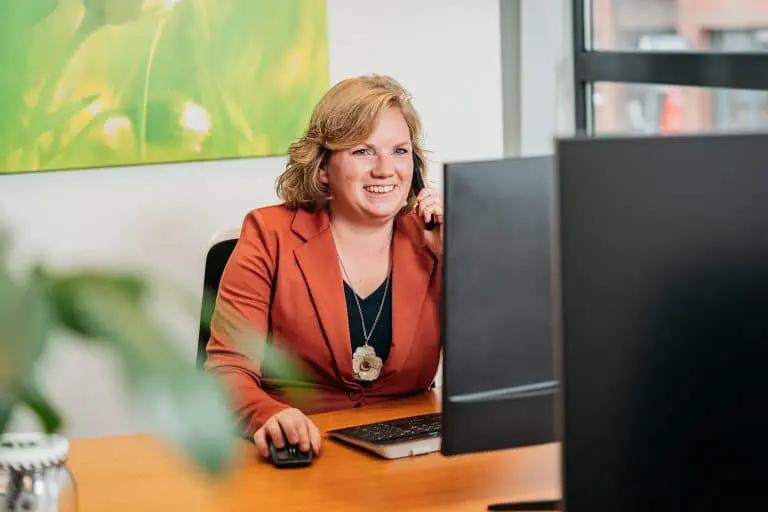
A better world begins with the reuse and sustainable recycling of equipment. This way no new raw materials need to be extracted and no extra CO2 is released. CTG Circular makes this possible and refurbished more than 150,000 pieces of equipment last year. Many assets got a second life. Not only in developing countries, but also within Europe. In this way, CTG Circular builds bridges over the digital divide, together with Close the Gap.
“Many people think that there is only a digital gap between countries or continents, but we see even within the Netherlands and Belgium that there is a gap,” says Wilton Scheerder, director of business development at CTG Circular. “Especially during the corona pandemic this became more than clear. Children from poor families received home education from their parents, but they had no access to computers or tablets to do their homework. Or what about lonely elderly people who could no longer make contact with their family members? Thanks to the support of the Belgian government, we were able to donate 18,000 devices to these vulnerable target groups.”
CTG Circular is part of Close The Gap: a non-profit organisation that aims to reduce the so-called ‘digital gap’. CTG Circular collects not-so-old and used ICT equipment and ensures that the goods get a second life. As well as the charitable arm, there is also a commercial branch. “Many companies replace their equipment after three to five years,” Wilton continues. “We collect the equipment and ensure that sensitive data is removed. We use Blancco software for this. This software meets the highest security standards, giving us a 100% guarantee that all data is gone. We then repair and sell the equipment. In the case of commercial agreements, the customer receives a share of the proceeds.” Wilton notes that companies like to be completely unburdened in this area.

The company runs completely on its own application FRIS. This is an extensive Delphi application with the complete customer database, all information about the devices and a complete warehousing and order system. When a used device arrives, the asset gets its own registration number after which the first registration takes place. The data is removed and all internal specifications are automatically taken over in FRIS. An operator checks all specifications and gives the device a rating, for example Grade A is as good as new and Grade C is functioning with slight defects. If a device not reusable then it goes to be recycled. This application has been further developed by GDK Software’s Delphi programmers since 2019.
Fortunately, the cooperation with GDK Software is going very smoothly. “I notice that the Delphi developers at GDK Software are completely up to date. When we started talking to GDK it turned out that our software was not running on the latest version. GDK helped us and provided a complete Delphi upgrade. I am pleased to say that the process went smoothly and GDK Software deserves full credit for that. They did an excellent job. There was a certain fear beforehand that a lot would fall over, but that fear turned out to be unfounded. The Delphi developers work for many companies and keep track of the latest developments. You notice that in everything.”
The switch to a new Delphi version and further development of FRIS has significantly improved the human interface. “More overviews, easier to use, more understandable: the software has improved,” says the business development director. Wilton and the programmers are also continuously developing the application. “I collect the requirements from the company and make an overview of them. We work iteratively and with each sprint the programmers develop new functionalities. One of the latest functions is the ability to take and add photos. For some customers, there is a need to take a photo of the defects found. With the corresponding loads, the requested photos are taken and linked to the data of the asset.”
Wilton Scheerder, director business development at CTG Circular
Thanks to the efforts of CTG Circular, over 18,544 tonnes of CO2 emissions were avoided last year. “When a computer manufacturer makes a device, CO2 is released. Because we refurbish a used device, it is not thrown away and there are no additional CO2 emissions.” In the coming years, CTG Circular hopes to refurbish even more devices, making the market more sustainable. “At the moment we only have a small piece of the market, so there are plenty of opportunities.”
Outside the country, growth also continues. In 2020, the company started a fully operational refurbishing plant in Kenya. “We refurbish used ICT equipment in Africa and dispose of these products locally. We also train people to work in ICT. Our software runs locally, but is fully customised. It is not a question of copy-paste. Think of Kenyan VAT, own country codes and the possibility of remote monitoring via VPN connections.”
There are also plans to develop FRIS further. “For example, we want to synchronise the stock of the web shop with the stock of FRIS. If someone orders a laptop in the web shop, the product will be reserved in FRIS. In this way, we prevent a laptop or smartphone from being sold twice.” New device types and other products also appear continuously. Wilton: “A processor used to have one name, for example Pentium 75, but nowadays we talk about generations. One i3 processor is not the same as another. That’s why we also want to put the generation automatically in the system. These are small things, but it helps the operator and the sensitivity to error decreases.”
And the next step? Perhaps to other countries. “Worldwide, we hope to bridge the gap between rich and poor with refurbished devices. Then, of course, we will call on GDK Software again!”
Contact
GDK Software NL
(+31) 78 750 1661GDK Software UK
(+44) 20 3355 4470